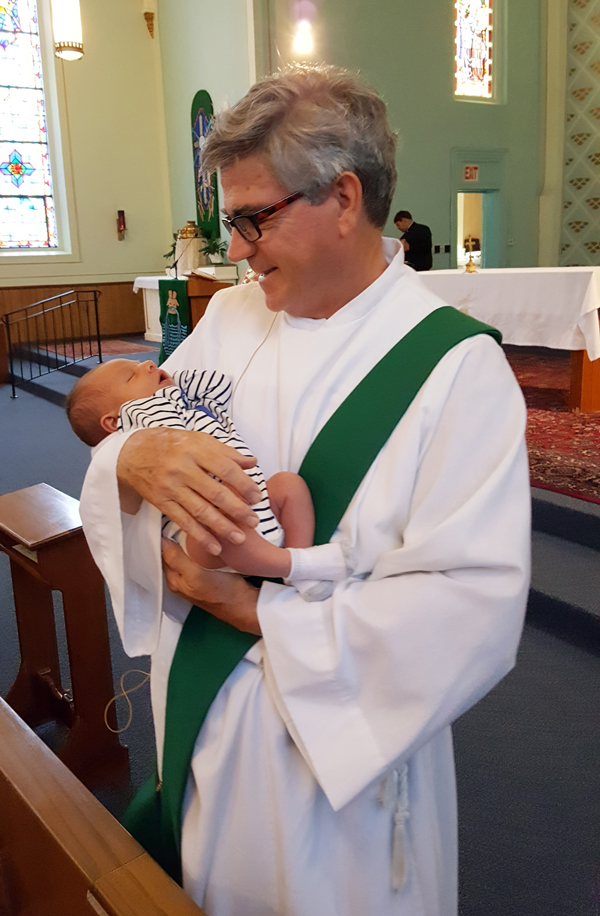By Lindsay Steele
Colorful blooms are among my favorite things in life. Every year I think I’ve figured out the secret to growing the flower garden of my dreams — repelling bugs, building fences, providing the proper amount of water so as not to drown or starve the plants, replacing the clay soil in my yard with something more fertile — but every year something new comes up to destroy the plants before they have a chance to bloom.

Deacon George Strader sings to Lindsay Steele’s son, Bradley, at St. Mary’s in Davenport last year. Deacon Strader, a widower, shares his thoughts on joy and disappointment.
For a while, I feel discouraged, as if I’ve wasted countless hours and that my efforts were in vain. I feel like a failure! But every year, I start anew with a sense of hope. I think of how happy I’ll be when I can bring an armful of cut flowers in the house and arrange them in a big vase. That hope keeps me from giving up.
I recently shared this wisdom with an acquaintance who is trying to conceive her first child. Because of a medical condition, each month spent trying is excruciatingly painful for her. I told her, “The moment you hold that baby in your arms, all of this will be worth it.” Hope is a powerful motivation.
But, I quickly saw a flaw in my logic. It’s easy, or at least easier, to hope when there’s still a chance that a desired outcome could come to pass. But what if she is never able to conceive or carry to term? How will she look back at this time? Will she consider it all a waste, and sink into despair?
It really got me thinking about hope in general. I decided to ask one of the deacons at my church, George Strader, about this topic. He supported his wife, Terry, through major surgery and several rounds of chemotherapy in an effort to combat an aggressive form of cancer. Sadly, these brave efforts could not keep the cancer at bay, and she passed away in January of last year. Deacon George maintains a loving, caring spirit as he deals with the grief of losing the love of his life, so I was interested in what he had to say.
If someone is already at the point where they know there is no hope left for the desired outcome — whether it is health or another situation in life — reframing the situation is essential. It’s natural to focus on the outcome as a “win or lose” proposition, but people shortchange themselves when they assume they can only find joy if they reach a desired destination. “We can often find joy in the journey,” said Deacon George.
Joy, he says, is not to be confused with happiness. It’s more about recognizing blessings no matter the circumstance. For example, when all hope of recovery was gone, Deacon George and Terry found joy in the strong outpouring of love from family and friends. Deacon George is now able to share what he has learned — and is still learning — to help other people who are enduring grief.
“There are many things that are gained while we are going through some type of loss, and maybe that’s a positive seed to plant,” he said.
(Editor’s note: Lindsay Steele is a reporter for The Catholic Messenger. Contact her at steele@davenportdiocese.org or by phone at (563) 888-4248.)











